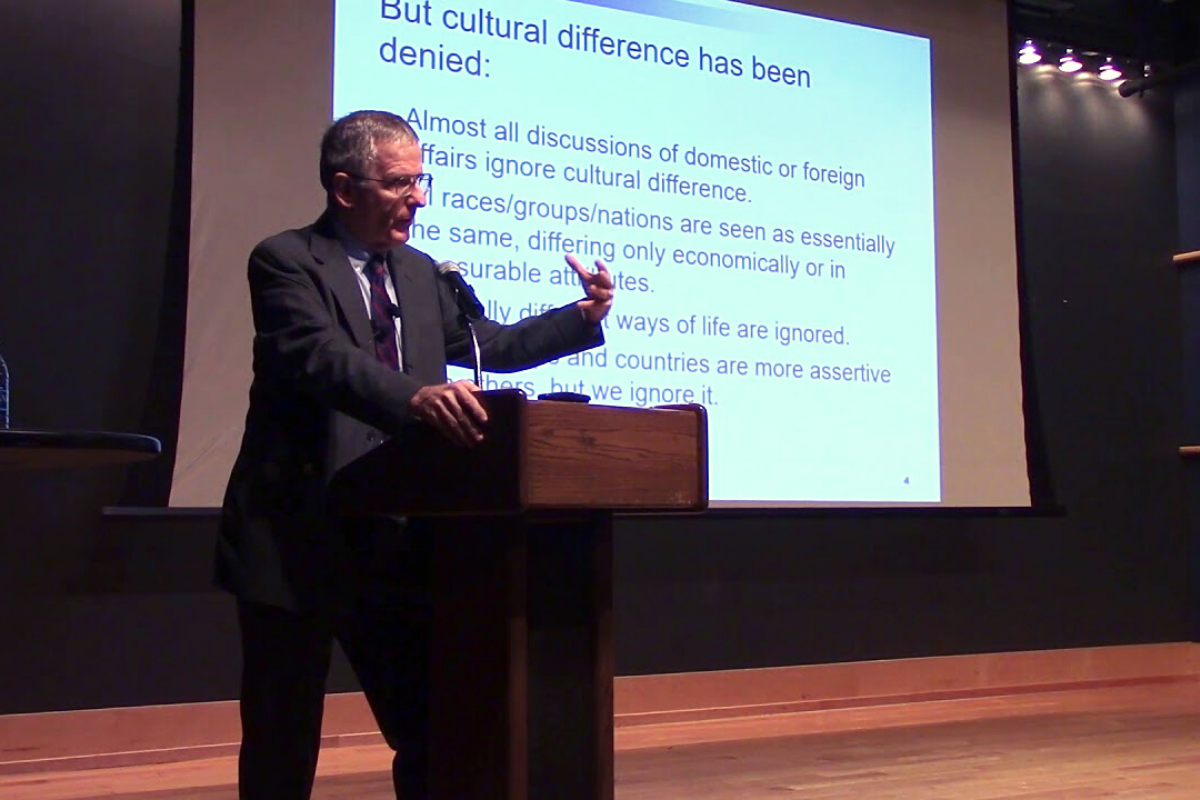Activism
The Lawrence Mead Affair
If someone puts forward a controversial theory, others should have the chance to criticise it.

Lawrence Mead, a long-time proponent of welfare reform, is a professor of politics and public policy at New York University. On July 21st this year, an ill-advised article he had written, ‘Poverty and Culture’, appeared in the academic journal Society.
The article began by asking, “Why do so many Americans remain destitute… even when jobs are available?” According to Mead, the answer is not “social barriers, such as racial discrimination or lack of jobs,” but rather “cultural difference.” Noting that “the seriously poor are mostly blacks and Hispanics,” he argued that such individuals have not internalised Western norms of individualism. As a consequence, he maintained, “they are at a disadvantage competing with the European groups—even if they face no mistreatment on racial grounds.”
Regarding the claim that “black social problems” are due to “white oppression,” Mead argued, “By that logic, the problems should have been worst prior to the civil rights reforms in the 1960s.” Yet in his reading of events, “The collapse of the black family occurred mostly after civil rights rather than before.” Hence Mead not only suggested that Western culture is better than non-Western culture, at least when it comes to getting ahead in America, but also that higher poverty rates among blacks and Hispanics are attributable to factors other than racial discrimination. As you can imagine, this message was not warmly received.
By July 24th—three days after the article was published—a Twitter mob had begun to form. In a tweet that got more than 2,400 likes, one commentator offered the following points of criticism: “F**K LAWRENCE MEAD! F**K WHOMEVER ALLOWED THIS TO GET PUBLISHED! F**K THE EDITORS! F**K THE REVIEWERS!” [asterisks not in original]. The next day, an account currently under the name “bring back misandry” wrote, “Tbh f**k academia. Violent anti-Blackness cloaked in bs intellectualism.”
By July 26th, there were two separate petitions calling for Mead’s article to be retracted. The first, which eventually garnered 1,053 signatures, described the article as “unscholarly” and “overtly racist.” The second, which garnered an impressive 3,510 signatures, went even further. According to the petitioners, Mead’s article expressed “racially violent narratives directed at the Black and Latina/o/X community.” Not only that, but the ideologies he espoused “are reflective of the racist, anti-Black, patriarchal, hegemonic doctrines perpetuated in society, PreK-12, and in higher education.”
On July 27th, the Faculty of Arts and Science at Mead’s own university, NYU, issued an official statement. It began by noting that Mead’s article “has caused great distress within our community.” While the statement acknowledged that “Professor Mead has the same rights to freedom of expression as we all do,” it rejected “the article’s false, prejudicial, and stigmatizing assertions about the culture of communities of color.” It also emphasised the need to “amplify our fundamental values of diversity, inclusion, equity, and belonging”.
On July 30th, two more official statements were issued. The first was from Springer Nature, the publishing company that owns the journal Society. It stated, “We are deeply concerned that flaws in our publishing process resulted in a commentary article being published… without proper editorial oversight.” And it concluded, “We are deeply sorry for the distress and upset that our publication of this paper has caused.” (Knowing that a large, multinational publishing company feels something “deeply” is always reassuring.)
The second statement was from the directors of 10 poverty research centres based at American universities. Like the NYU statement, it acknowledged that “Professor Mead has the same rights to express his opinions as we all do” but insisted that his conclusions are “false, without any supporting evidence, and completely unfounded.” Also like the NYU statement, it emphasised the need to “center our work on fundamental values of diversity, inclusion, equity, and belonging.” (I have noted previously that these kinds of statements often read like they were generated by an algorithm.)
On 31 July, Mead’s article was retracted. In accordance with this decision, Springer Nature issued an update to its statement of 30 July, which noted, “We are deeply sorry that this commentary was published in one of our journals”. (The company apparently felt that its earlier apology had not been sufficient.)
Likewise, Society’s editor-in-chief said, “I deeply regret the pain that this has caused.” He also explained that his original intent had been to publish Mead’s article alongside two critical reviews “that identify flaws in Mead’s arguments.”
Mead himself refused to give any ground, telling Campus Reform that “his argument was entirely non-racial and only had to do with cultural differences between Western and non-Western groups.” He also affirmed, “There is no evidence” that serious multigenerational poverty is caused by racism.
The Mead affair, as people who follow these sorts of things will know, played out in much the same way as other recent scandals, such as the one involving Tomas Hudlicky or the one involving Norman Wang. Twitter activists sounded the alarm that a “problematic” paper had been published. Universities and other organisations scrambled to issue denunciations while reaffirming their commitment to “diversity, inclusion and equity.” After a brief “investigation,” the offending paper was retracted.

I should add, for my part, that I did not find Mead’s arguments particularly convincing. Most significantly, his claim that “non-Western culture” prevents minorities from getting ahead would seem to be contradicted by the success of Asian Americans, who enjoy higher average incomes than white Americans, and similar poverty rates. Mead even mentioned that “some Asian countries have recently become richer and more powerful,” despite the fact that “their way of life is collective,” but made no real attempt to reconcile these observations with his theory.
However, just because I was unconvinced by Mead’s arguments does not mean that his article should be ceremonially denounced by half the people in his field, nor that it should be retracted from the journal where it was published. Indeed, the criticism I made above could also be made of the claim that racism causes poverty (Asians too have been subject to racism), and I wouldn’t want papers putting forward that theory to be retracted either. Another consideration is that Mead’s paper was a “commentary,” rather than a “research article,” so there was presumably more scope for him to defend his own perspective on the subject matter.
As mentioned above, Society’s editor-in-chief had originally intended to publish Mead’s article alongside two critical reviews. To my mind, this would have been exactly the right way to handle the incident. If someone puts forward a controversial theory, others should have the chance to criticise it, and the rest of us can then decide whether that theory has any merit. However, the mere presence of Mead’s article on the journal’s website was apparently too distressing for his critics, so it had to be purged straight away.
One particularly interesting aspect of the Mead affair is that many academics now consider it “racist” to invoke culture as an explanation of group differences. Back in 2009, the psychologist Richard Nisbett noted that he had gotten “remarkably little criticism” for his work on group differences in IQ because he was “saying genetics plays no role.” However, Nisbett did argue there are subcultures “that discourage academic achievement.” One wonders if he could make the same argument today.






